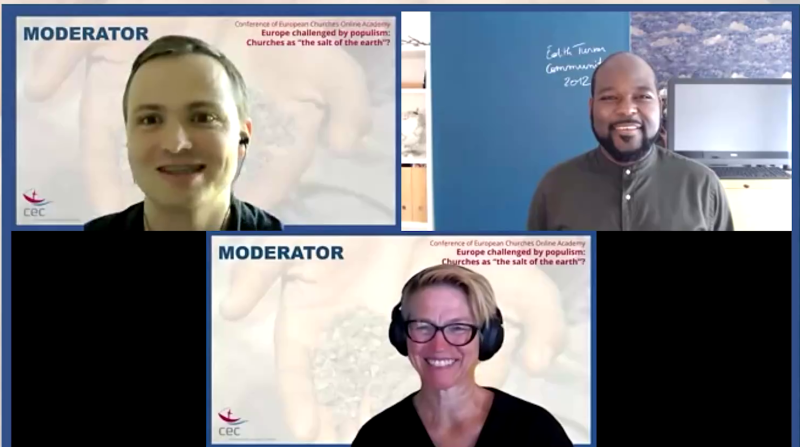How can European churches deal with populism by being the “salt of the earth”? The question guided a lively exchange at the Online Academy on Populism, Diversity and Democracy organised by the Conference of European Churches (CEC) from 21 to 22 June 2021.
The event focused on the theme “Europe challenged by populism: Churches as ‘salt of the earth’? How to contribute to living peacefully together in diversity” inspired by Matthew 5:13.
The salt metaphor functioned as common thread in the programme. Participants reflected on how to find not only “tasteless” and negative elements in populism, but also “tasty” and positive elements that churches can use, connecting them with the message of the Gospel.
Christel Lamère Ngnambi, political scientist and co-author of the book “Is God a Populist?” described populism as a narrative or mechanism where existing distrust in society is used systematically. “Populists do that by addressing peoples’ fears, and expressing empathy to counter distrust in society by promoting a narrative of community.”
He challenged the idea of “combatting an evil enemy and the claim that only the populist leaders have the solution”. He critiqued how the populists deliberately amplify polarisation, especially between the people and the elite.
Christel Ngnambi shared, “I really liked the approach the Academy took. To look at these tasty and tasteless elements, and at how churches can connect and react to them, was very fruitful. It was a pleasure for me not only to offer a keynote and take part in discussions. An open dialogue about populism with people from different backgrounds is exactly what we need.”
Case studies from Romania, Italy and Hungary were shared, providing rich material for discussions in small group sessions, where participants reflected on how churches can tackle “tasty and tasteless elements of populism”. In Romania, where two opposing populist movements exist, Prof Adrian Papahagi from the Babes-Bolyai University in Cluj, analysed both movements by using the idea of salvation and by emphasising the universality of Christianity.
The coordinator of Mediterranean Hope project of the Federation of Protestant Churches in Italy, Paolo Naso, spoke about populist movements in Italy since the 1990s, describing how Protestant churches are engaged in projects related to migrants and asylum seekers, in sharp contradiction to the populist message.
Alex Wimberly, leader of the Corrymeela Peace and Reconciliation Centre in Northern Ireland, put forward an important element to counter populism – that of building relationships. He encouraged participants to create a “salty connectivity, a place of connection, which offers a sense of belonging, and where all individuals are empowered as equals.”
The academy prepared by CEC’s Thematic Group on Education, Democracy and Diversity gathered around 35 scholars, lay people, pastors and priests from diverse backgrounds. The interactive nature of the event generated free and open dialogue on populism.
Klicken Sie hier für die deutsche Fassung
Webinar Video: Salt of the Earth: Churches in a pluralistic society in the 21st century
